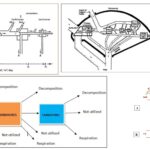O Level Biology 32 Views 1 Answers
Sourav PanLv 9November 3, 2024
Describe the process of germination, including the role of enzymes
Describe the process of germination, including the role of enzymes
Please login to save the post
Please login to submit an answer.
Sourav PanLv 9May 15, 2025
The process of seed germination is a complex series of events that transforms a dormant seed into an active growing plant. This process is heavily reliant on the action of enzymes, which facilitate the breakdown of stored food materials and support the growth of the plant’s embryo. Here’s a detailed description of the germination process, including the role of enzymes.
Process of Germination
- Imbibition:
- The first step in germination is imbibition, where the seed absorbs water through its seed coat (testa). This absorption causes the seed to swell and activate metabolic processes.
- The uptake of water breaks down the seed coat, allowing internal structures to expand and initiate growth.
- Activation of Metabolism:
- As the seed absorbs water, it triggers biochemical reactions that lead to the activation of enzymes. These enzymes are crucial for mobilizing stored nutrients within the seed.
- Enzymes such as amylase, protease, and lipase play significant roles in this stage:
- Amylase breaks down starch (a complex carbohydrate stored in the cotyledons) into maltose and glucose, providing energy for growth.
- Protease catalyzes the breakdown of proteins into amino acids, which are used for synthesizing new proteins and enzymes necessary for growth.
- Lipase breaks down lipids into glycerol and fatty acids, serving as an additional energy source for the developing embryo.
- Growth of Embryo:
- With energy derived from these metabolic processes, the embryo begins to grow. The radicle (embryonic root) emerges first, anchoring the plant and allowing it to absorb water and nutrients from the soil.
- Following the radicle, the plumule (embryonic shoot) grows upward toward the surface, aiming to reach sunlight for photosynthesis.
- Cell Division and Expansion:
- The energy produced from the breakdown of stored food fuels cell division and expansion in both the radicle and plumule. This growth is critical for establishing a healthy seedling.
- Enzymes continue to play a role in facilitating these processes by providing necessary substrates for cellular activities.
Role of Enzymes
- Enzymes are biological catalysts that speed up chemical reactions without being consumed in the process. In germination:
- They enable rapid conversion of stored food materials into usable forms (e.g., starch to glucose).
- They support various metabolic pathways essential for growth and development.
- The activity of enzymes is influenced by environmental conditions such as temperature and moisture; optimal conditions enhance their effectiveness.
1
1 likes
- Share on Facebook
- Share on Twitter
- Share on LinkedIn
0 found this helpful out of 0 votes
Helpful: 0%
Helpful: 0%
Was this page helpful?




